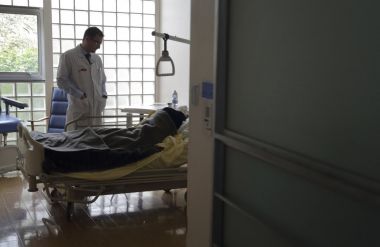BBC's decision to advertise suicide is a disgrace

BBC 2's "How to die: Simon's choice" told the story of Simon Binner, 57, who was diagnosed with motor neurone disease in January 2015. He decided, after months of deliberation, to go to the Eternal Spirit suicide clinic in Switzerland to end his own life. In the BBC's own words the film was a "dramatic and poignant story of one man facing the heart wrenching decision of whether to end his own life at a suicide clinic after being diagnosed with motor neurone disease". During the film, you can watch as Simon records a heartbreaking message for his wife, Debbie, and then turns on the drip to administer the lethal drug that will end his life.
Some may argue the BBC was right to show this moving film. Some might even say it was simply documenting the truth. But this film knowledgably touches on a very polarising subject. And the moment, therefore, the BBC decided to show this programme, the moment they took a stance by failing, repeatedly I might add, to show the other side of the debate is the moment they entered this issue by very clearly taking the side of assisted suicide campaigners. It would be utterly naïve to suggest the BBC had no ulterior motives.
But what on earth was the BBC thinking? This is taking the principle of 'edgy' television to a whole new and gruesome level. Exploring sensitivities around death is one thing, but actually filming the last moments of someone's life and then allowing it to be broadcast to millions is something else entirely. And this is not exactly the first time the BBC has committed this cardinal sin of advertising assisted suicide. For years now they have been following the assisted suicide agenda with more than a hint of bias. Back in 2011, they showed a documentary by assisted suicide campaigner Sir Terry Pratchett which showed the final moments of a man helped to die. Then in 2013, the BBC gave full airtime to Lord Falconer to tell the world why he wanted to introduce assisted suicide into the UK. In 2014, the BBC came under fire again because they showed a television drama about a pregnant woman who prepared lethal drugs for her ill mother. Not once, during that programme, did they even mention that assisted suicide is against the law.
Have the controllers and producers simply given up pretending? The BBC's own guidance warns that 'Factual reporting and fictional portrayal of suicide, attempted suicide and self-harm have the potential to make such actions appear possible and even appropriate, to the vulnerable.' Before the film was even aired, the Samaritans contacted the BBC to suggest certain scenes should be removed, because of the disturbing nature of them. Perhaps the BBC should nail their colours to the mast rather than using words like 'powerful' and 'dramatic' to describe the very personal, sensitive and private last moments of an individual. By showing this programme at all, there is the suggestion that what Binner did is the norm in society today. But it is not and there is a real danger this programme will actually end up encouraging people to end their own lives. Anything that normalises suicide should be regarded as dangerous with potentially harmful consequences.
This film was emotional and it was very, very sad. But relying upon emotions and feelings to make laws is a very, very bad idea. Hard cases make bad laws, or so the saying goes. And it is absolutely true. For every Simon, there is a John, a Ruth, a George and a Michael who decide, no matter how bad the diagnosis, to choose an alternative and to receive hospice care and palliative care. Where are their stories? Why doesn't the BBC prepare a documentary telling the untold story of all the major disabilities groups who are opposed to assisted suicide?
Do you want to know what the woman who runs suicide clinic Eternal Spirit said to Mr Binner's wife when she visited the clinic and expressed doubts? Dr Erika Preisig asked Debbie if she wanted to keep her husband alive just so he could be her 'human pet'. That is a disgusting, insulting, rude and utterly absurd statement. Even considering it makes my blood boil. That is emotional blackmail, founded upon a deeply unsettling worldview. No motor neurone sufferer is ever, at any stage, a 'human pet'. No-one, no matter how debilitating their condition, is ever a 'human pet' because every life has value to it. This insensitive, crass question is unfair: it is designed to engineer guilt within those who disagree with assisted suicide. You should not feel guilty because you want nature to take its course, rather than trying to control death, with all that means for you and for your family.
This is not about choice. It is about how we as a society treat those with disabilities, with abnormalities, with terminal illnesses and those who are old. We don't want to be encouraging suicide. Shame on the BBC for showing this. Shame on them for advertising suicide. Shame on them for repeatedly failing to highlight the alternatives, such as palliative care and hospices. MPs voted down the last attempt to permit assisted suicide and did so by a clear and overwhelming majority. This documentary was deeply disturbing and it is a disgrace that the BBC chose to show it.
James Mildred works for CARE but writes in a personal capacity.











